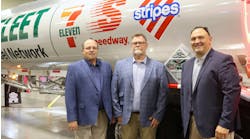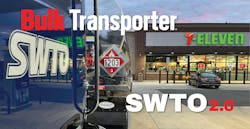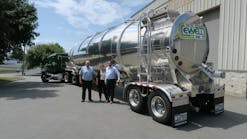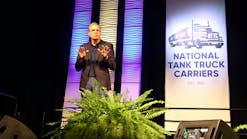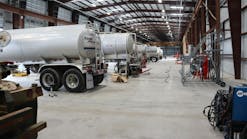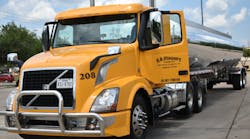Carriers that haul dry bulk and liquid commodities in specialized tank trailers have extensive driver training needs. A full day of job orientation training might be spent on hazardous material (hazmat) shipments, for example, or policies for OSHA compliance.
Tank carriers have traditionally used passive, video-based driver training content. The shortcomings of this approach have prodded the industry toward a modern learning management system (LMS) with fresh content delivered in mixed mediums to make training highly efficient and effective.
Robust orientation
Improving the orientation process is often the primary motivation for results-oriented fleets to adopt a new LMS platform and training content.
In September 2020, Peoria, Ill.-based Fort Transfer switched from using video-based training to the Luma eNugget LMS platform from Luma Brighter Learning. Fort Transfer operates 160 power units and hauls bulk commodities that include liquid herbicides, isopropyl alcohol and general chemicals.
Seth Leitner, director of safety and security, describes the Luma eNugget LMS, with its “expertly” designed content, as “better, fresher and easier to get through” for drivers.
Fort Transfer pays drivers an hourly rate during orientation. The Luma LMS made it possible to compress the amount of time drivers spend in training by five hours per person. The company hires three or four drivers per week, and its tighter training schedule reduces orientation costs by about $80 per driver.
The company had approximately 100 drivers go through orientation from September 2020 to March 2021 for a total savings of more than $8,000, Leitner said.
Petroleum Transport Company began using the eNugget LMS in July 2020. The Pilot Mountain, N.C.-based company operates 150 trucks and employs 280 drivers for transporting gasoline, kerosene and other petroleum products locally. The Luma platform has made orientation a more organized and paperless process, said Shannon Branch, director of compliance and human resources.
The fleet created custom modules within the eNugget LMS to introduce the company and its core values to drivers. Petroleum Transport Company also is using Luma’s Rapid Forms tool to digitize employment forms and driver qualification files, which can be imported to Tenstreet, their applicant tracking system.
Due to the need for social distancing during the COVID-19 pandemic, drivers could login at home to start orientation and complete employment forms. When drivers came to the office with all of their training and paperwork complete, it was “a real time saver for us,” Branch said, noting the company has safely returned to in-person orientation training.
R.B. Stewart has been using the Luma platform since January 2020. The Angleton, Texas-based company transports refined petroleum products in Texas, Alabama, Georgia, and Florida. The short, interactive eNugget learning modules have made it possible for R.B. Stewart to double the amount of information drivers receive in three or four days of orientation, said Sam Pogue, director of operations.
The company previously used a video-based training platform that wasted time and frustrated drivers by forcing them to re-watch videos if they incorrectly answered questions on assessments. If drivers miss test questions in the Luma platform, the module shows the correct answers and lets drivers immediately retake tests, he explained.
The eNugget LMS comes with a collection of nearly 700 customizable modules, called Luma eNuggets, that cover relevant safety, compliance, and orientation training topics. One of the modules that tank carriers use is the Interactive Emergency Guidebook for Hazardous Materials Training.
The module makes training efficient and fun for drivers. Besides reading about and getting tested on the different types of hazmat classifications, drivers use a game element to see how fast they can match the correct classes for select examples of materials.
Diverse training
After drivers complete assigned orientation topics, fleets have ongoing training needs that include updating drivers on customer loading and unloading procedures, addressing fleet-wide safety trends and giving drivers individualized training.
Petroleum Transport uses the flexible design templates in the eNugget LMS to create custom modules to explain customer-specific loading and unloading requirements, as well as modules that cover the operating procedures for specialized trailers with vapor recovery systems, Branch said.
The company is in the process of creating new training modules for dispatchers that explain various customer requirements and how to use features in the company’s dispatch software system, among other topics, she noted.
Fleet managers can assign eNugget modules to employee groups or individuals in the LMS. Assignments can be sent out on a schedule or on demand via the Luma mobile app, as emails or as SMS text messages with a link to log in to the platform.
When drivers log in, they gain immediate access to a library of previously assigned eNuggets to use as a reference to efficiently find job- and safety-related information. They can search for training topics as well.
Drivers for R.B. Stewart regularly use the Interactive Emergency Guidebook as a reference.
Every three years, drivers must pass a 12-part test (HM126F) for hazmat shipments. During their daily work, “there is no way a driver is going to remember all of the chemicals and stuff from taking that test,” Pogue said. “With Luma, drivers can go in and search and find out what is really important. Before, drivers couldn’t access that anywhere.”
For routine policy updates and communications, R.B. Stewart uses the eNugget LMS to create and send custom eNuggets rather than emails. The LMS confirms that employees have received and read the eNuggets, explained Staci Franklin, onboarding and recruiting coordinator at R.B. Stewart.
Fleets also can utilize a secure video conference tool in the LMS, LumaLive, to hold live training meetings.
“Live meetings are something I’ve really been a big proponent of,” Leitner said. “We’ve had a few so far and it has worked out well.”
Fort Transfer is using a Luma app on tablets alongside its electronic logging device (ELD) and other applications. The company assigns monthly eNuggets on safety topics, and uses LumaLive for quarterly safety meetings and for one-on-one driver coaching, he added.
Maximizing returns
Modernizing driver training can have positive, long-lasting impacts on tank fleet safety, driver satisfaction and retention.
Fort Transfer’s Leitner believes the Luma training platform has contributed to the company’s record-low DOT incident rate. The rate decreased from 0.42 (incidents per million miles) in 2019 to 0.20 at the end of 2020, and carrier only had two injuries that resulted in workers comp claims last year.
“I think a lot of that has to do with newer drivers getting better training content,” Leitner said. “Having an extra tool in our toolbox where drivers are able to reference things, on the fly, has helped.”
R.B. Stewart is saving time and money daily, and improving driver job satisfaction from using the Luma platform to digitize its document management process for load permits and other driver necessities.
Luma developed a custom portal for R.B. Stewart that automates the flow of documents to drivers’ company-issued iPads. Drivers log in to the portal, select their truck and trailer number, and all documents associated with their vehicle and loads become available.
Previously, drivers were spending 20 to 30 minutes each day getting their paperwork together when starting their shifts and could not leave the yard until it was completed, Pogue said.
“When we announced this process in a safety meeting we got standing ovations from drivers,” he said.
R.B. Stewart has more than 100 drivers in its fleet, and each is saving up to 30 minutes every day. The time savings directly impacts revenue and cost. “It really adds up,” Pogue concluded.

